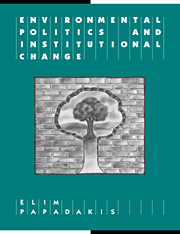Book contents
- Frontmatter
- Contents
- List of Tables and Figures
- Preface and acknowledgements
- Abbreviations
- Part I Introduction
- Part II Political Institutions, Innovation and Social Change
- 4 The ‘centrality’ of political institutions
- 5 The circularity of political communication and dialogue
- 6 Disrupting the circularity of political communication: the role of social movements
- 7 Design, evolution and the environmental movement
- Part III Political Organisations and Adaptation
- Part IV The Media, Agenda Setting and Public Opinion
- Part V Conclusion
- Appendix: Codes used in tables 9.1 to 12.1
- Notes
- References
- Index
6 - Disrupting the circularity of political communication: the role of social movements
Published online by Cambridge University Press: 18 December 2009
- Frontmatter
- Contents
- List of Tables and Figures
- Preface and acknowledgements
- Abbreviations
- Part I Introduction
- Part II Political Institutions, Innovation and Social Change
- 4 The ‘centrality’ of political institutions
- 5 The circularity of political communication and dialogue
- 6 Disrupting the circularity of political communication: the role of social movements
- 7 Design, evolution and the environmental movement
- Part III Political Organisations and Adaptation
- Part IV The Media, Agenda Setting and Public Opinion
- Part V Conclusion
- Appendix: Codes used in tables 9.1 to 12.1
- Notes
- References
- Index
Summary
Most institutional history moves slowly. One explanation for the slow movement of ideas, customs and practices is that political communication, like other forms of interaction, often operates in a circular or self-referential manner. This chapter, by focusing on social movements, explores how we can circumvent or break out of these circular patterns of communication, how institutions can become more responsive to new issues, ideas and challenges, and how social forces can reshape and influence the rules and procedures of institutions. Social movements can play a crucial role in challenging the slow movement of institutional history. There is general agreement among social theorists that the collective action by social movements ‘involves a specific type of socially conflictual relationship’ and that the types of social movement include the ‘classical’ workers' movement at the turn of the century, the student and civil rights movements in the 1960s and the ‘new social movements’ which, in the 1970s and 1980s, focused on or rediscovered questions of the environment, women's rights and peace (Renon 1994: 599). In the area of social movements the notion of the slow movement of institutional history is by definition subjected to a challenge: ‘Most social theorists agree that this mode of collective action [social movements] involves a specific type of socially conflictual relationship’ (Renon 1994: 599).
Sociology has spawned widely diverging views about the role of social movements. For a long time many sociologists felt that social movements did not exercise a positive influence on political debates.
- Type
- Chapter
- Information
- Environmental Politics and Institutional Change , pp. 48 - 55Publisher: Cambridge University PressPrint publication year: 1996



